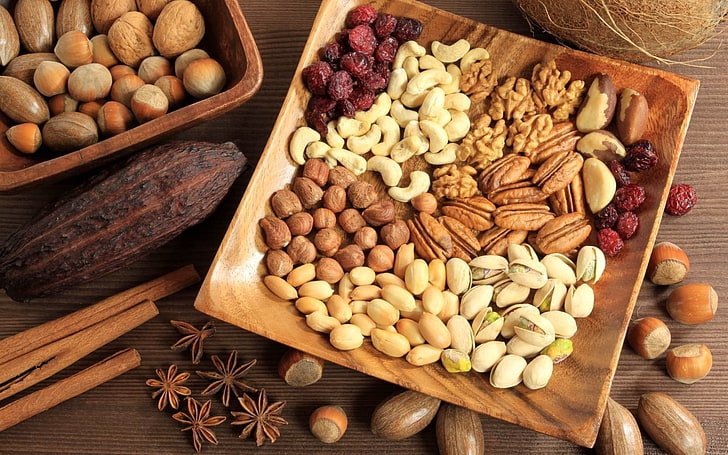Nuts have long been celebrated as one of the most nutritious foods available, packed with essential vitamins, minerals, and healthy fats. Whether you’re snacking on almonds, walnuts, pistachios, or cashews, these tiny powerhouses are not only delicious but also provide a range of health benefits that can enhance your well-being. In this article, we’ll explore the numerous advantages of incorporating nuts into your daily diet and why they are considered a superfood for overall wellness.
What Makes Nuts a Superfood?
Nuts are considered a superfood due to their impressive nutrient profile. They are rich in:
• Healthy Fats: Primarily unsaturated fats, which are beneficial for heart health.
• Protein: Nuts are an excellent source of plant-based protein, making them a perfect snack for vegetarians and vegans.
• Fiber: They promote digestive health and help with weight management by keeping you full longer.
• Vitamins and Minerals: Nuts are loaded with essential vitamins like vitamin E and B vitamins, as well as minerals like magnesium, selenium, and zinc.
• Antioxidants: Many nuts are high in antioxidants, which help fight free radicals and reduce inflammation.
Top Health Benefits of Eating Nuts
1. Heart Health
One of the most widely recognized benefits of nuts is their ability to promote heart health. Regular consumption of nuts has been linked to a lower risk of heart disease due to their high content of unsaturated fats, particularly omega-3 fatty acids found in walnuts. These fats help reduce cholesterol levels, improve the function of blood vessels, and lower inflammation.
A study published in the New England Journal of Medicine found that people who ate nuts regularly had a 20% lower risk of dying from heart disease compared to those who didn’t include nuts in their diet. Almonds, in particular, have been shown to lower levels of LDL cholesterol (the “bad” cholesterol) and improve cardiovascular health.
2. Weight Management
Despite being high in calories, nuts can actually help with weight management. Their combination of protein, fiber, and healthy fats makes them a satisfying snack that can help curb hunger and prevent overeating. Research suggests that people who include nuts in their diet tend to have lower body weights and a lower risk of obesity over time.
Pistachios, for example, are often referred to as a “skinny nut” because of their low calorie content compared to other nuts. Studies show that eating pistachios may support weight loss by promoting feelings of fullness and reducing cravings for unhealthy snacks.
3. Rich in Antioxidants
Nuts, particularly walnuts and pecans, are packed with antioxidants that help protect your cells from oxidative damage caused by free radicals. Antioxidants play a key role in reducing inflammation, preventing chronic diseases, and slowing the aging process.
Vitamin E, found in almonds, hazelnuts, and peanuts, is a powerful antioxidant that protects cell membranes from damage and supports skin health. Brazil nuts, known for their high selenium content, also provide potent antioxidant benefits, helping to protect the body from oxidative stress and reducing the risk of certain cancers.
4. Supports Brain Health
Nuts, especially walnuts, are often referred to as “brain food” due to their high levels of omega-3 fatty acids, vitamin E, and antioxidants. These nutrients are essential for maintaining brain function, protecting against cognitive decline, and reducing the risk of neurodegenerative diseases like Alzheimer’s.
Several studies have suggested that regular consumption of nuts may improve memory, learning, and overall cognitive performance. The anti-inflammatory properties of nuts also play a role in protecting brain health and reducing the risk of age-related mental decline.
5. Regulates Blood Sugar Levels
Nuts can be an excellent addition to the diet for individuals with type 2 diabetes or those at risk of developing the condition. Their low carbohydrate content and high levels of healthy fats, fiber, and protein help regulate blood sugar levels and improve insulin sensitivity.
Almonds and walnuts, in particular, have been shown to reduce blood sugar spikes after meals, making them a great snack option for those managing diabetes. Including nuts in your diet can also help prevent complications associated with diabetes, such as heart disease and stroke.
6. Supports Digestive Health
The fiber content in nuts promotes healthy digestion by supporting regular bowel movements and feeding beneficial bacteria in the gut. Pistachios and almonds, for example, are prebiotic foods, meaning they help feed the good bacteria in your digestive system, which in turn supports overall gut health and boosts the immune system.
A healthy gut is essential for digestion, nutrient absorption, and immune function, and adding nuts to your diet can play a significant role in maintaining a balanced gut microbiome.
7. Promotes Healthy Skin
Nuts are a natural source of vitamin E, a key nutrient for maintaining healthy, youthful skin. Vitamin E is known for its ability to protect skin cells from oxidative damage, reduce inflammation, and keep the skin hydrated. This makes nuts an excellent addition to any diet aimed at promoting a glowing complexion.
Almonds, in particular, are rich in vitamin E and are often used in skincare products for their hydrating and anti-aging properties. Regular consumption of almonds and other nuts can help improve skin elasticity and reduce the appearance of wrinkles.
Which Nuts Are Best for Health?
While all nuts offer health benefits, some are particularly nutrient-dense and provide specific advantages for certain conditions.
• Almonds: High in vitamin E, magnesium, and fiber; great for heart health and skin.
• Walnuts: Rich in omega-3 fatty acids; supports brain and heart health.
• Pistachios: Low in calories; supports weight management and digestive health.
• Cashews: High in iron and zinc; beneficial for immune health and energy levels.
• Brazil Nuts: Rich in selenium; powerful antioxidant benefits, supports thyroid function.
• Hazelnuts: High in vitamin E; good for skin health and lowering cholesterol.
How to Incorporate Nuts Into Your Diet
Incorporating nuts into your daily diet is easy, and there are many ways to enjoy them:
• Add a handful of nuts to your morning oatmeal or yogurt for a nutritious breakfast.
• Snack on a mix of nuts and dried fruit as a healthy, energy-boosting snack.
• Sprinkle chopped nuts on salads for added crunch and flavor.
• Use nut butters, such as almond or peanut butter, as a spread on toast or in smoothies.
• Incorporate nuts into baked goods, such as muffins or energy bars.
Remember, while nuts are packed with nutrients, they are also calorie-dense, so it’s important to consume them in moderation to avoid excess calorie intake.
Conclusion
Nuts are a versatile and nutrient-packed food that can provide a wide range of health benefits, from supporting heart health to promoting weight loss, enhancing brain function, and improving skin health. Whether you’re looking to improve your diet or simply want a healthy, satisfying snack, nuts are an excellent choice to boost your overall well-being. By incorporating a variety of nuts into your daily routine, you’ll be fueling your body with essential nutrients and setting the foundation for a healthier, happier life.
Sources
1. Harvard T.H. Chan School of Public Health – The Nutrition Source: Nuts
2. American Heart Association – Health Benefits of Nuts
3. National Institutes of Health (NIH) – Nutritional Benefits of Nuts
This comprehensive guide to the benefits of nuts outlines why they should be an essential part of any healthy diet. Whether you’re aiming for better heart health, improved brain function, or glowing skin, nuts are a simple yet powerful food that can make a significant difference in your overall health.





